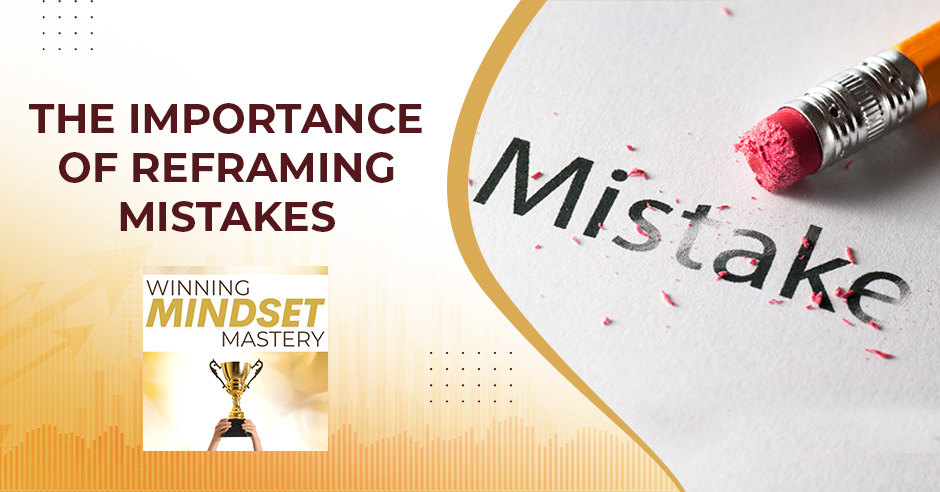
A question for you: How do you feel about making mistakes? And when you make a mistake, how does it impact your mindset? Some people allow a mistake to wreck their winning mindset. For many years, April was one of them. But she learned how to overcome that tendency. She discovered how to reframe mistakes in such a way that she was able to maintain her winning mindset. She can help you do the same. If you fear mistakes and worry about how they might upset your winning mindset, this episode of the Winning Mindset Mastery Podcast is for you!
—
Listen to the podcast here
The Importance Of Reframing Mistakes
I have a question for you. How do you feel about making mistakes? More importantly, how do you feel that impacts your mindset? For many of us, making a mistake is not a big deal. We just roll with it. We figure out how to remedy it and keep going about our day. For other folks, and I was in this group for many years, making a mistake can be the quickest way to wreck that winning mindset and take them into a much less empowered place.
If you aren’t sure which of those two you are and you could be confused if you’re like, “I feel like it’s a big deal but I’m not sure if I overreact. I don’t know.” Here’s a great test to know. I want you to think about how you would react to a mistake that a good friend made that didn’t impact you at all. Perhaps they did something with their partner or something at work but they made a mistake. They came to you and felt bad about it. How would you speak to them? What would you say to them about what they did?
Would you say not to beat themselves up and not to worry about it? Here are some potential solutions that you see. Probably. Think about how you would react if you made a similar mistake with a partner at work, wherever it was. If your self-talk immediately goes to things you would never say to a friend, things like, “That was so stupid. I can’t believe you did that. You ruined everything,” that is an indicator that you don’t react to mistakes in a way that empowers you.
If you’re interested in why different people can be different ways, part of it is the way that we’re wired, and what type of personality we have. Another potential part is that at some point in your past, being wrong felt dangerous to you. I’m not saying that it necessarily was dangerous. I’m not saying that if you were wrong, something horrible was going to happen to you. Remember that when we’re younger and children and experiencing things, especially with people in positions of authority who we like and admire, their disapproval can feel highly emotional and dangerous to us because we seek approval when we’re young just innately the way that our biology is wired.

Reframing Mistakes: Different people can be different ways; part of it is the way that we’re wired and what type of personality we have.
If you experience something with a parent, a coach, an aunt, an uncle, any adult, or a person of authority that was upsetting to you when you were young, then you could have a heightened reaction to mistakes now. I share that with you because you can dig into that if you would like and solve that and see where you go with it. For me, it was always easier to start to change a behavior if I understood where it came from.
Here’s the good news. Mistakes, like any other situation, can be reframed and allow you to come at them from a place of being empowered and finding solutions. In our reframe, I’m going to share one of my mistakes. I have software that sends out emails for different things in my business. Lots of people probably are familiar with these kinds of software.
Mistakes, like any other situation, can be reframed and allow you to come at them from a place of being empowered and finding solutions. Share on XI went to check on something when I had some folks do some emails for the show to see how they were set up and how they were going. I realized when I went in there that someone had made a mistake and paused emails on my book. Those particular emails were requests or answers to requests for people to download a copy of the first chapter of both the audiobook and the digital book.
When I say someone made this mistake, let’s be clear that someone was me. There was a whole group of people that were sitting in a queue who had requested this book that I say, “You can go and easily download on my website,” who hadn’t gotten it. I will tell you that for years, I was that person that a mistake like that would’ve thrown me. I would’ve felt like a bad business owner or a bad employee. I can’t believe I caused someone to have that client experience.
I could easily spin into a spiral of telling myself what a terrible person I was instead of finding a solution. This is where the reframe comes in. This is where you say to yourself, “I made a mistake. Everyone makes mistakes. There are also a lot of different ways that I can fix this mistake. If I do it well, I can make both myself and the client glad that it happened.” Now, I know that sounds crazy but bear with me. I’ve got a process and I’ll show you what I mean.
The first step is to assess the impact. How many folks were affected by this particular mistake? Who do I have to tell? How big of a solution am I going to have to come up with? Some people wouldn’t start with impact because that might make them more nervous but it’s a great place to start from because a lot of times, a mistake didn’t have a huge impact. You’re overreacting to what you perceive as a much bigger issue. Once you have that impact, now we take ownership.
For me, this is going to take the shape of me sending out personal emails to each person who was impacted by my pause of that campaign and didn’t get to download the audio and eBook first chapter. I’m going to let them know that the mistake was mine and that I am truly sorry for any inconvenience or dissatisfaction that caused them and that I want to make it right.
This is step three because making it right isn’t just fixing it back to the way it should have been. It’s going one step further and hero-ing it. For these particular folks, it’s going to be offering them either the audiobook or the eBook. Whichever they would prefer for free to let them know that I am impacted by the idea that they had a bad experience and it matters to me to make it better for them. The way that you handle a conflict with a client, a disagreement, or their dissatisfaction can lead them to like you better and trust you more than they ever did before.

Reframing Mistakes: The way that you handle a conflict, a disagreement, or a client’s dissatisfaction can lead them to like you better and trust you more than they ever did before.
The same for colleagues and for bosses. When you come back with a solution that shows that you’re taking ownership, that you care about what happened to them, and, “By the way, I want to go out of my way to make this better for you.” It works with businesses too. I can give you an example from my business bank. I had an issue a couple of years ago that was making it difficult to do business because I travel all around the country.
When I asked the branch manager of my bank to help me with it, he said, “I can’t help you.” I didn’t think that was the last answer. I was very frustrated but I thought, “Maybe he is super busy. Maybe he doesn’t know if there’s an answer. Maybe he doesn’t have the time to go track it down.” I reframed him too. I love that. I decided to send an email to the head of all business banking for my bank.
Now here’s what was interesting. Up until this point, I liked my bank fine. I didn’t love them. I didn’t hate them. They were just my bank. What was interesting is, I was so irritated by this problem but when I emailed the head of business banking, I didn’t hear back from her. She was the CEO of that division. I heard back from two other individuals within less than 24 hours, who not only gave me a solution for what was going on with me personally.
They let me know that other people had had a similar experience so they’d been working on a solution for everyone that they were going to be deploying within the month and that they were going to give it to me early. Look at that. What was a mistake or a bad situation made me feel even better about my bank. There are situations like that all the time.
Here’s how I’d suggest you reframe anything that happens to you at work. 1) Assess the impact. That is both so that you can share that with anyone you need to and so you know how big of a lift that solution is going to need to be. 2) Figure out how you own up to the individuals that were impacted. The reason for this is taking ownership when you make a mistake is one of the quickest ways to boost confidence in you, again, with the folks that you are taking ownership to. Also, start to re-earn their trust.
The third part is one of the most important but it only works if you did the other two. 3) Figure out how you hero it. Figure out how you apologize or fix the issue in such a way that the other person that’s impacted walks away thinking, “I’m glad that happened.” If you have another situation that you would like to use for next the episode’s reframe or if you have something that you’d like me to reframe personally and we’ll talk one-on-one, go to the website WinningMindsetMasteryPodcast.com.

Reframing Mistakes: Figure out how you apologize or fix the issue in such a way that the other person who’s impacted walks away thinking, “I’m glad that happened.”
All the way at the bottom is a section for Ask April where you can record a personalized message and I will record a personalized answer. Keep it private and we’ll have a two-way conversation because I want to do anything and everything I can to help you reach that consistent winning mindset as quickly as possible. Here’s to your success.





